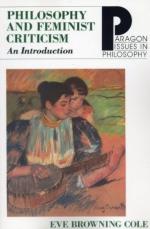|
This section contains 2,579 words (approx. 9 pages at 300 words per page) |

|
How Far Can It Be Argued That Popular Culture Is Ideological: a Discussion in Relation to Feminism
Summary: Examines the influence of ideology on popular culture, from a feminist perspective. Discusses the feminist suggestion that women construct their identities in accordance with the female stereotypes that are presented to them in newspapers, magazines, television programmes, films and popular literature.
The Marxist concept of ideology is used to express the way in which the dominant group in a society controls the norms and values of that society at the level of ideas. As they own and direct the production of popular cultural products the dominant group are able to present their ideas as both normal and natural and `so mystify the `real' conditions of existence' (Hall.1992.p348). In this way the group holding power exercises maximum control with the minimum of conflict. The general population accepts the status quo as inevitable, and revolution is avoided. While Marxists view this as a matter of Capitalist control, Feminists see ideological domination as the means by which women are encouraged to accept a subordinate role in patriarchal societies. Simone de Beauvoir articulated the experience of being a woman as being socially constructed, suggesting that,
No biological, psychological, or economic fate determines...
|
This section contains 2,579 words (approx. 9 pages at 300 words per page) |

|


